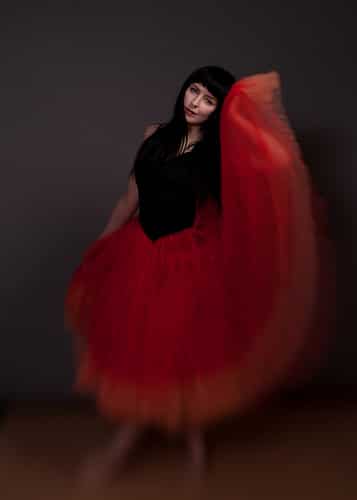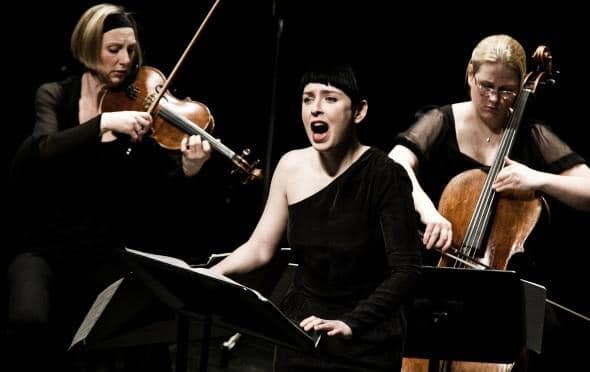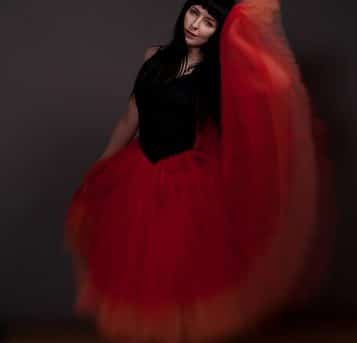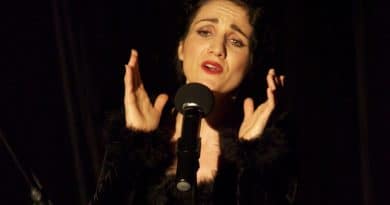Dark Mofo: Allison Bell
Dark Mofo 2015 is under way, complete with a fire-breathing organ at Macquarie Point, numerous exhibitions and installations celebrating the unusual and macabre, and the trademark beam of white light piercing the icy Hobart night sky. The performing arts program is just as interesting. Anthony and the Johnsons are are sold-out and Melbourne’s The Rabble’s are already home, but tickets are available for an exciting concert next weekend by internationally acclaimed soprano Allison Bell, who chatted with Josephine Giles via Skype as she was preparing to fly to Hobart for rehearsals.

Tasmanian-born Bell moved to London when she was 21 and quickly established herself as one of the leading and most exciting performers of 20th and 21st century music. Though now in her 30s, and “still a proud Taswegian”, she didn’t make her professional Australian debut until 2012.
A fortuitous conversation with Tasmanian Symphony Orchestra manager Simon Rogers led to an appearance with the TSO at Mona’s inaugural Synaesthesia and a return visit in 2014 for Synaesthesia+ to sing Schoenberg’s Pierrot Lunaire.
Mainland audiences will get to see Bell in October, performing a piece written for her by Australian composer Brett Dean, on a national tour with the Australian String Quartet,.
Bell and members of the TSO, conducted by Kwame Ryan, are performing pieces by contemporary classical composers Claude Vivier, Salvatore Sciarrino and Unsuk Chin at the Farrall Centre, Friends School Hobart on Saturday 20 June.
JG: The Dark Mofo program is typically enigmatic in its description of your show: “Experimental compositions from three left-of-centre masters of contemporary classical, performed by avant-garde soprano Allison Bell and fourteen members of the Tasmanian Symphony Orchestra.” When I hear the words experimental music, I often think of distortion, loud noises, of it being quite a difficult experience.
AB: That’s a kind of old-world description I think. And to call me avant-garde; okay, that’s one perspective I guess, but I absolutely hear where you’re coming from.
When it comes to experimental … Look I hate those kind of labels to be honest, because it does alienate a lot of people, like you say. A lot of people have connotations attached to those particular descriptions, which means they would run a mile or not willingly want to come.
I’m not an intellectual musician. I’m a really instinctive performer and that’s how I like to experience my music as well.
JG: How should audiences prepare for experiencing this sort of music?
AB: You don’t have to prepare in any particular way because it’s not alienating.
It’s just really interesting storytelling, really beautiful music and interesting sounds. It does take you to different emotional states, but you’ve just got to come in, sit down and chill out.
Basically it’s entertainment. I think you should go in there with open ears and an open mind and be surprised at what happens.
JG: How was the program designed and the pieces chosen?
AB: Both the pieces I’m performing by Unsuk and Vivier have been on my hit-list for quite a while and they’re not easy to program. They are so difficult for the players, and also these days, orchestras and ensembles are really preoccupied with making money. Festivals like MOFO, Dark Mofo and Synaesthesia are so amazing because profit is not the end game; it’s just about bringing great works of art to the public. So I thought this could be great way to get these pieces out there.
I’m interested in storytelling without following a necessarily straight narrative form. The Vivier, Trois airs pour un opera imaginaire, has a very strong sense of storytelling but there are only five words “Wo bist du, O liebe,” (Where are you, O my love). The rest is just an invented language by Vivier; the voice becomes a part of the ensemble and the whole ensemble tells the story.
Likewise with the Unsuk Chin piece, Akrostichon-Wortspiel (Acrostic Wordplay). It consists of seven scenes from fairy tales, The Endless Story by Michael Ende and Lewis Caroll’s Alice Through the Looking Glass. The language in the texts has been manipulated: sometimes the vowels and consonants have been randomly joined together, they’re out of order, the words are written and sung backwards. Only the symbolic meaning remains.
We’re invited to experience various different kinds of not only musical states but emotional states. From the light and the funny, very sardonically funny, to the surreal through to the totally grotesque and disturbing.
There are pieces in there that are very at the heart of Dark Mofo. Darkness and winter and grotesque fairy beings coming out of the wood work and kind of grabbing your soul.
I immediately thought of Kwame Ryan the conductor, because we had been chosen, funnily enough, by Unsuk Chin, to sing the Vivier at the London Festival Hall with the Philharmonia as part of a Vivier festival she was doing. We did all the rehearsals and I was so excited. But then the day of the concert, I came down with flu so I had to cancel.
I’ve been champing at the bit ever since! And to do it with Kwame. He’s an amazing musician, he works very closely with Unsuk, and he’s one her conductors of choice. So we’re really lucky, it’s a bit of a coup for Tassie to have him.
Luckily he was available and it was he and Simon Rogers who came up with the Sciarrino – another visionary-like composer using sound worlds that are totally his own – to make up the rest of the program.
JG: You are a sought after performer of contemporary music but you’ve sung your fair share of the traditional soprano coloratura repertoire. Technically, are the two compatible, or do you have to specialise?
AB: You don’t have to specialise. At the moment, I’m rehearsing some Janacek and also some Wagner.
You have to have a pretty good technique; you can’t mess around with contemporary music. I’d never be able to make any of these sounds, sing something like Pierrot Lunaire, had I not first studied traditional classical vocal technique and sung a lot of Mozart and bel canto.
Sometimes because of the way you have to produce sounds that are without vibrato, very straight instrumental tone so you blend in with the ensemble rather than being a soloist, means that you have to then relax the larynx by singing a nice juicy bit of Puccini or Janacek or something.
It’s really good to less loose with that kind of operatic sound. Because when I let my natural voice come out, it is a big dramatic coloratura.
But it does require a lot of discipline. You have to be careful as any kind of singer; in the way that you practise and making sure you work with the right people to give you the tools to do it safely.
I’m as surprised as anyone one that I’ve turned out as a contemporary music specialist. There’s no way when I got asked to do some of these first things back in the days that I thought I would be capable of doing it. But I’ve found that if you understand the music and the text and the feeling, particularly a piece like Pierrot, its amazing how your psyche creates those sounds.
It’s like an exorcism, kind of!

JG: You are a very physical performer. Do you have a fitness regime or does the performing keep you fit?
AB: The performing, and day-to-day life, keeps me fit. I walk everywhere, and also practising.
It’s so physical to produce these sounds. Of course I do warm up. I work with a physio once a month for maintenance, and have stretches for the neck, body, diaphragm and things like that.
JG: On the day of a big performance what’s your routine?
AB: In a perfect world, I’m quite relaxed. By that time you’ve done most of the hard work. I like to sleep in, take it easy, wake up slowly, warm up a bit sometime early afternoon at home, get to the theatre a couple of hours before the show, put on your make-up, do your hair then warm up a little bit more.
These days its not as Diva or relaxing as I would like: you’re still having dress rehearsals on the day. Invariably it’s a little more chaotic than the audience or public would generally think.
JG: And after the show? What’s your treat, your reward or relaxation?
AB: Reward is definitely a huge meal after the show.
I’ve got a real sweet tooth. If I see a little speciality local cake shop – I’m not going to lie – I’ll get something like that to put in my dressing room for after the performance. As soon as I come off stage I’ll lock the door, no one can see me for a couple of minutes, and I’ll just eat that!
JG: So just one more question. If you weren’t a singer, what would you be?
AB: A film director.
Don’t rule that out! You know life is long and I might not be a singer for ever. That’s definitely my great love. Cinema.
JG: If you could combine the two that would be really fabulous.
Yeh, it would be. Lets hope!



